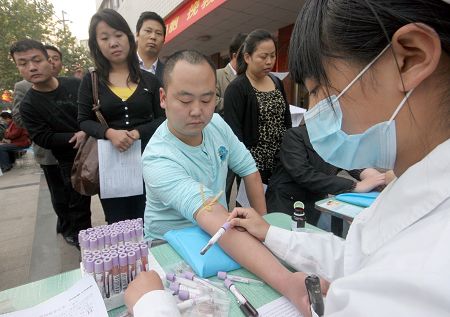Blood dearth postpones operations
A months-long shortage of blood supplies to hospitals in southwestern Kunming, Yunnan Province, appears to have worsened, after the majority of operations requiring blood transfusions were postponed, causing concern over the efficiency of the country's blood- storage system.
 |
|
Residents donate blood in front of a hospital in Shangqiu, Henan Province, on October 13. |
The city's blood reserves are at just 20,000 milliliters, while the demand is 20 times that, Li Kaihong, a spokesperson at the Kunming Blood Center, told the Global Times Tuesday.
The center supplies blood to almost 200 hospitals in the city.
Blood storage in the city is approaching its lowest level ever, the Shandong Business Daily reported.
The three-month long blood shortage has left doctors with no option but to delay operations on patients with non life-threatening injuries, the paper said.
A woman almost bled to death early this month when the hospital she was admitted to had only two bags of blood - far less than she needed, the paper said. The woman was finally saved after doctors and her family drove around the city to collect blood from other hospitals, it said.
"We really understand the concerns of patients' families, but there's nothing we can do," the paper quoted a medical worker as saying.
The shortage of blood in Kunming dates back to the beginning of this year and has become more acute in recent months, Li said.
"The blood storage is exacerbated and has worsened as patients from surrounding regions are flocked to the city for medical care," Li was quoted as saying.
Kunming does not appear to be an isolated case, however, as China is said to have suffered an "anemia" due to the blood shortage. According to the World Health Organization, blood storage per person per year should be at least eight milliliters, which means that China was short of the 7,609 tons needed in 2008, the Chinese Society of Blood Transfusion said that year.
Despite a huge demand for blood for medical uses, a stable blood-donation source also appears to be lacking. Blood donation in China is voluntary and without payment, and people without sufficient understanding of blood donations generally avoid it.
The major blood donors are army servicemen and college students who are voluntarily giving their blood, statistics show.
"There are dismissive misconceptions such as blood donation being bad for the health, and that's why we need more publicity to make the public aware of the truth about blood donations," Zhou Lihua, an expert with the AIDS research center at the Henan University of Traditional Chinese Medicine, told the Global Times.
Zhou believes a small subsidy for nutrition or transportation would provide people with an incentive to donate blood.
"Efforts need to be made to popularize blood donation and related medical knowledge to allay the public's concerns about blood donation," Ma Linkun, deputy director of the First Affiliated Hospital of Kunming Medical College, was quoted by the Yunan Daily as saying.
Ma also called for transparent publicity, stipulated by the Blood Donation Law, as people have the right to know how and where their donated blood has been used, the paper said.
Blood banks also suffer seasonal shortages, such as when the H1N1 epidemic struck.
Beijing saw shortages of donations when H1N1 made people fear going out, let alone to donate blood, the Xinhua News Agency reported.
 0
0 






